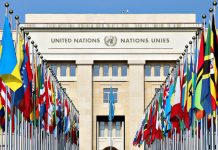DM Monitoring
Bishkek: In recent years we can increasingly observe that many countries, entire regions are in search of integration processes and strengthening of ties. Economic instability in the world, difficult security situation, challenges and threats associated with international terrorism, and now the COVID-19 pandemic, force to build their foreign and domestic policies differently. Kyrgyzstan has been active in the international arena in recent years. The direction of cooperation on the platform of the EU and the OSCE is one of the most promising.
“It must be said that cooperation with the OSCE is necessary because this organization has a serious influence on the world political map. OSCE recognition of democratic tendencies in this or that country gives confidence in joint work and implementation of many joint projects. The OSCE is objectively a strong organization, and countries like Kyrgyzstan should seek common ground with it for the future, for the development and establishment of their own statehood. Kyrgyzstan is one of the few countries in the post-Soviet space, which can boast achievements in the field of democratization of society, citizens’ rights and freedoms, constitutional rights, and so on. Hence the conclusion: Kyrgyzstan is already close to the level of self-sufficiency to be a more confident player in the international political field,” believes political scientist Mark Antonov.
It is worth saying that over the past few years, the countries of Central Asia and the Organization for Security and Cooperation in Europe have gone through a difficult journey from high expectations and optimistic hopes to critical reticence and the need to revise the OSCE’s Central Asian strategy. The difference in mental culture and historical assumptions has made it difficult to connect the European gene with the Central Asian mentality. This also speaks to the historical strength of self-identification. However cooperation, in particular with the OSCE, will continue and there is no doubt that it will be productive, taking into account all the interests of the region.
International relations expert Viktor Chernykh notes that “the end of the twentieth century was marked in world history by the collapse of the Soviet Union and the socialist camp and the revision of the policy of confrontation. Young states appeared on the political map of the world. New countries, after gaining their independence, faced many challenges, the most important of which was the search for self-identity, the choice of socio-economic and political development path, and the formation of the foreign and security policy model. The proclamation of the course on democratic development became a reliable guarantor of material and financial assistance, investments, political support and recognition by the developed countries of the West.
Economic attractiveness, above all in terms of investment, pushed European countries to begin a new and active dialogue with all countries of the Central Asian region without exception.
The motivation for this has been the comprehensive development of all available resources, as well as the provision of security norms and a targeted fight against terrorism.



